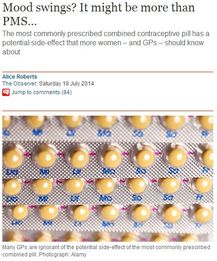"[T]here was something else that Greenhouse said that immediately caught my attention: for some women with more extreme cyclical mood changes, going on the pill could be disastrous."
Shouldn't we expect more critical thinking on health-related issues from scientists, especially those who engage frequently with the public?
How should we weigh anecdotal evidence?
For someone (especially a scientist! with a large online platform!) to posit anecdotal evidence as a basis for guiding clinical practice is irresponsible. That does NOT mean that this potential association should not be considered in well-designed scientific studies.
On Twitter, someone noted that the anecdotal story was interesting, but asked for scientific studies to back up the claims. Roberts replied:
.@Shingle_beach @hollygriggspall On PMS & PMDD: http://t.co/v2Yq1TlZVI On the pill & mood changes: http://t.co/oEKU6CrEeb
— Prof Alice Roberts (@DrAliceRoberts) July 20, 2014
Back in Twitterverse, (conspiracy?) theories were already flying - such as (I'm paraphrasing):
- research isn't done on this issue because scientists shrug off its importance and ignore women's voices, or
- studies do suggest links, but those studies are suppressed by Big Pharma, or
- (By Dr. Roberts herself): general practitioners won't speak out on this issue because of:
@Shingle_beach @hollygriggspall @bengoldacre [whispers] Big Pharma.
— Prof Alice Roberts (@DrAliceRoberts) July 20, 2014
OK Chelsea...so what do YOU think the data say on this issue?
My philosophy is that we should always remain open to new scientific information, and never, ever cherry-pick evidence - which is why I am such a big fan of systematic reviews. I hope to look at these data in-depth soon, but for the time being, I've started a list of the studies at the end of this post. Please feel free to add to this list* (hopefully without regard for the study conclusions; as that part comes later).
Sooooo, then, what's your point?!
Anecdotal stories are highly meaningful to each individual, should not be ignored by clinicians, and are sometimes important signals for larger issues. But scientists and others must be careful not to rely on anecdotes instead of data when looking at issues on a population level. This article (and the many others like it) risks scaring women away from a method that might otherwise be a good fit for them, which is no laughing matter when over 50% of pregnancies in the United States are unintended (and nearly 50% in England and Wales), and when unintended pregnancy may also be associated with mood disorders or complicate treatment for women with pre-existing mood disorders. Women need options; what works well for you may not work well for me, and vice versa.
Roberts concluded her article by noting that the whole thing "makes [her] just a little bit angry. Not irrationally angry. Not irritable. Just proportionately, understandably angry."
You and me both, sister. You and me both.
References:
Mood swings? It might be more than PMS… By Alice Roberts. The Guardian/The Observer. Published July 19, 2014.
Hatcher RA, Trussell J, Nelson A, Cates W, Kowal D. Contraceptive Technology, 20th Revised Edition. Atlanta, GA: Ardent Media, Inc., 2011.
*Some studies identified on this issue, presented in no particular order, and with no claim that this search was comprehensive or systematic.
http://www.ncbi.nlm.nih.gov/pubmed/24043440
http://www.ncbi.nlm.nih.gov/pubmed/23944249
http://www.ncbi.nlm.nih.gov/pubmed/22467147
http://www.ncbi.nlm.nih.gov/pubmed/17629629
http://www.ncbi.nlm.nih.gov/pubmed/17161120
http://www.ncbi.nlm.nih.gov/pubmed/11479103
http://www.ncbi.nlm.nih.gov/pubmed/3978343
http://www.ncbi.nlm.nih.gov/pubmed/22465115
http://www.ncbi.nlm.nih.gov/pubmed/23864301
http://www.ncbi.nlm.nih.gov/pubmed/24015872
http://www.ncbi.nlm.nih.gov/pubmed/23219471
http://www.ncbi.nlm.nih.gov/pubmed/23121822
http://www.ncbi.nlm.nih.gov/pubmed/23131613
http://www.ncbi.nlm.nih.gov/pubmed/22673038
http://www.ncbi.nlm.nih.gov/pubmed/23152475
http://www.ncbi.nlm.nih.gov/pubmed/22537684
http://www.ncbi.nlm.nih.gov/pubmed/22136510
http://www.ncbi.nlm.nih.gov/pubmed/23833619
http://www.ncbi.nlm.nih.gov/pubmed/22166277
http://www.ncbi.nlm.nih.gov/pubmed/21840911
http://www.ncbi.nlm.nih.gov/pubmed/18288601
http://www.ncbi.nlm.nih.gov/pubmed/18599013
http://www.ncbi.nlm.nih.gov/pubmed/18760521
http://www.ncbi.nlm.nih.gov/pubmed/19041441
http://www.ncbi.nlm.nih.gov/pubmed/17314012
http://www.ncbi.nlm.nih.gov/pubmed/17713839
http://www.ncbi.nlm.nih.gov/pubmed/16580672
http://www.ncbi.nlm.nih.gov/pubmed/16206030
http://www.ncbi.nlm.nih.gov/pubmed/14710055
http://www.ncbi.nlm.nih.gov/pubmed/12128235
http://www.ncbi.nlm.nih.gov/pubmed/22473394
http://www.ncbi.nlm.nih.gov/pubmed/19067135
http://www.ncbi.nlm.nih.gov/pubmed/17688380
http://www.ncbi.nlm.nih.gov/pubmed/17362710
http://www.ncbi.nlm.nih.gov/pubmed/16299641
http://www.ncbi.nlm.nih.gov/pubmed/15236788


 RSS Feed
RSS Feed